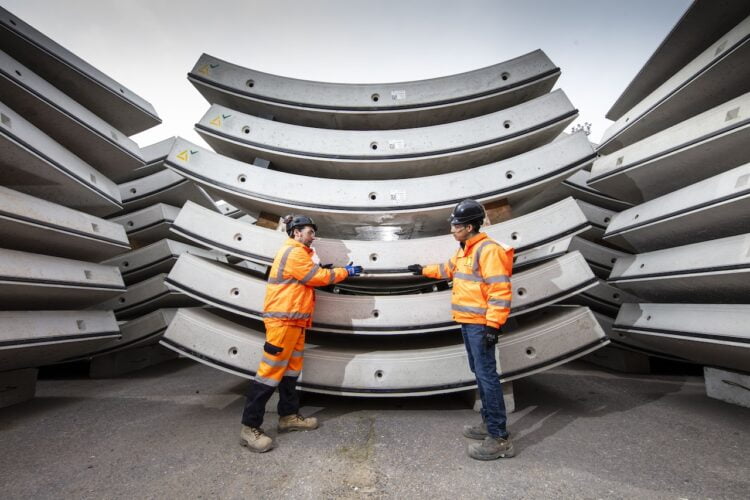HS2’s West Ruislip Portal site in Hillingdon has seen its tunnel ring segments moved by rail, which has seen one million miles of lorry movements taken off of the already congested UK road network.
HS2‘s London tunnels contractor, Skanska Costain STRABAG, has taken delivery of the huge tunnel ring segments using freight trains since February this year. The deliveries were able to be taken once the two Tunnel Boring Machines, named Sushila and Caroline, began their arduous task and creating the necessary space to access the railhead at the site.
The tunnel ring segments for the Northolt Tunnel West are made by Pacadar UK at Thamesport on the Isle of Grain in Kent. 60,000 Segments will be made for the project in order to make up 8,400 rings to cover 5 miles of the twin bored tunnels. The location of the Pacadar factory also supports the delivery of the segments delivery by rail.
To date, more than 120 trains, averaging 5 trains each week, have completed the journey from the Isle of Grain to West Ruislip to deliver the tunnel ring segments. One train can carry 144 of the segments, which is enough to make more than 20 tunnel rings.
Whilst the tunnel is being constructed, 400 freight trains will be used to deliver the tunnel segments, which should see a reduction in carbon of around 2,250 tonnes due to how HS2 and its contractors have approached the project logistics in an environmentally sustainable way. HS2 Ltd and Skanska Costain STRABAG work closely with Network Rail and the UK’s leading freight operators in order to make this possible.
From the early part of next year, two more Tunnel Boring Machines will begin work to complete the 8.4-mile Northolt Tunnel East using a quartet of machines. This part of the project will see STRABAG manufacture segment rings for the Northolt Tunnel East at a new facility in Hartlepool, which will create 35,000 segments and will be transported by rail.
HS2 Ltd is extremely focused on seeing as many materials as possible transported by rail or waterways in order to reduce the impact of the project on the UK’s busy road network.

Pat Cawley, HS2’s Director for On Network Works, said:
“HS2 is committed to responsible construction and using the rail network as much as possible to deliver materials. By using freight routes to deliver tunnel ring segments manufactured by Pacadar to our West Ruislip tunnelling site, thousands of lorry movements will not be required.”
“Our freight programme is a result of extensive collaboration between HS2 Ltd, our contractors, Network Rail and the freight operators and we anticipate that over 20 million tonnes of materials will be moved by rail on Phase One of the HS2 programme.”
James Richardson, Managing Director of Skanska Costain STRABAG joint venture, said:
“By using 120 trains instead of lorries to move tunnel segments from Thamesport to our TBMs in West Ruislip, we’ve curbed transport-related emissions by 750 tonnes of CO2 so far, reaching the remarkable milestone of a million avoided lorry miles. This is just the beginning. Overall, across the life of our partnership with Pacadar, we’re projected to reduce our carbon impact by 2,250 tonnes.”
“When construction, manufacturing and rail freight industries work together to maximise transport efficiency, we save money, achieve reduced emissions, cut lorry traffic, and strengthen our industry-wide commitment to achieving a cleaner, greener, low-carbon future.”





Responses
It wasn’t just Beeching who failed to see the long term benefit of rail transport. The present Government is making a similar mistake by cancelling the Northern section of HS2 and selling off the reserved land.
Another nail in the Beeching coffin of moving freight to road. Never made any sense.